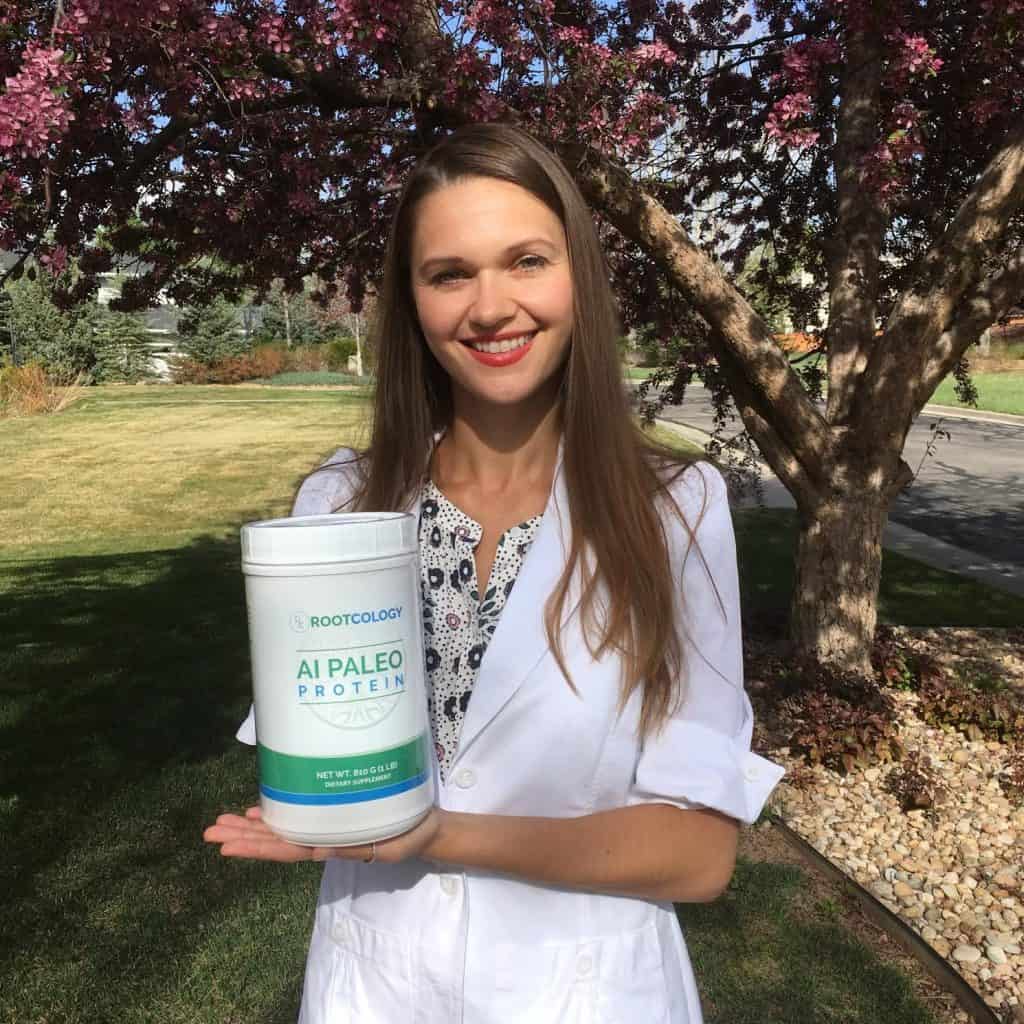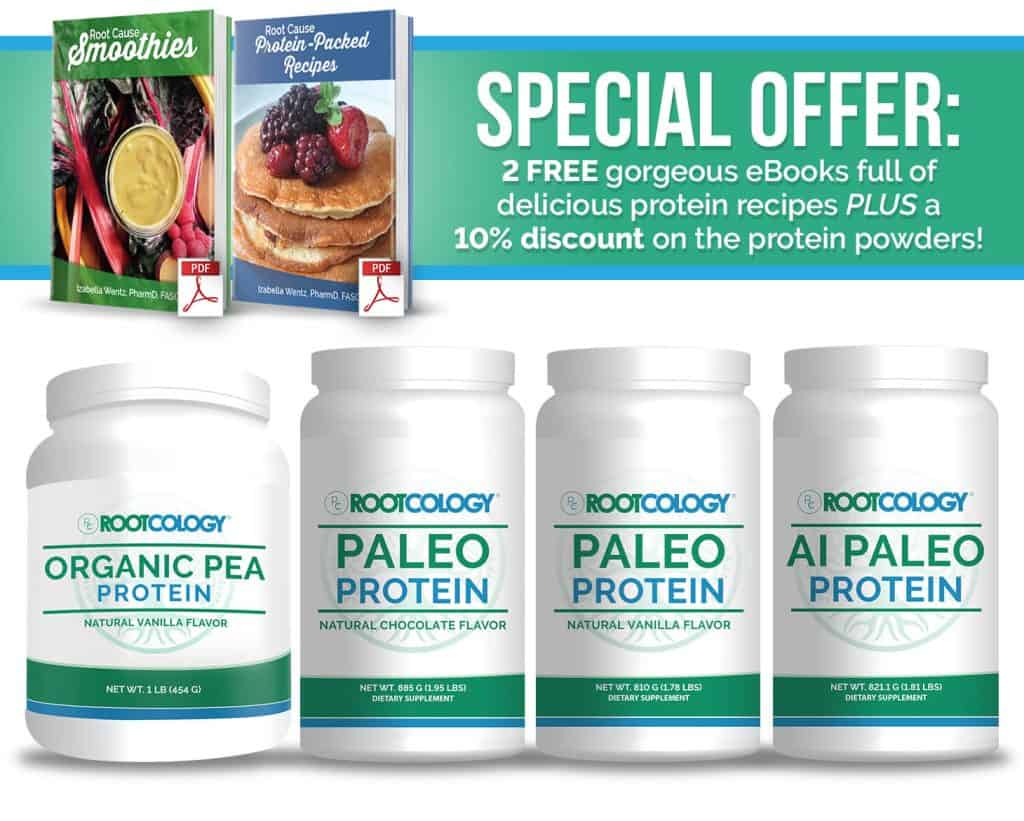Before I received my Hashimoto’s diagnosis, I used to start each day with a protein smoothie.
In some ways, this was a very positive habit; but in other ways, it was very detrimental to my health, and I didn’t even know it.
Protein is an essential macronutrient and helps us to build up our body, to ensure that all vital processes are taking place. Protein is an important source of amino acids such as glutamine and L-tyrosine, which repair gut cells and create thyroid hormones, respectively.
People eating the Standard American Diet, or vegan and vegetarian diets, may not get enough protein, and can be at risk for protein deficiency. Some symptoms include: fatigue, trouble losing weight, brain fog, blood sugar imbalances, trouble building muscle, muscle wasting, intestinal permeability, and hair loss.
Sound familiar?
In this article, I’ll explain:
- The importance of protein for Hashimoto’s
- The right amount of protein for you
- The benefits of protein smoothies
- The right types of protein for Hashimoto’s
- My favorite products
What Is Protein?
Depending on which article you read today, there is a lot of conflicting information out there about how much protein we should be consuming. The truth is, different people will need different amounts, depending on their lifestyle, life stage, and health conditions. However, we can’t deny that protein is essential to human life, and a crucial part of any diet.
Proteins are large molecules that our cells require to grow and mend themselves. Protein makes up about 15 percent of our body mass, and is consumed predominantly through animal sources, though there are many plant sources of protein as well. Chemically, protein is composed of amino acids, which are organic compounds made of carbon, hydrogen, nitrogen, oxygen, or sulfur. Amino acids function as a cell’s “building blocks”. [1]
People are able to produce some amino acids, but must get others from food. The nine amino acids that us humans cannot produce on our own are called essential amino acids. [2]
These consist of:
- Histidine: Needed for growth and tissue repair, and is important for the maintenance of myelin sheaths (fatty tissue) that protect nerve cells.
- Isoleucine: Promotes glucose consumption and uptake.
- Leucine: Contributes to the regulation of blood sugar levels; promotes growth and repair of muscle and bone tissue, growth hormone production, and wound healing.
- Lysine: Used in the biosynthesis of proteins and fighting viral infections.
- Methionine: A unique sulfur-containing amino acid that can be used to build proteins and produce many molecules in the body, including the antioxidant glutathione and the molecule SAMe, which improves mood.
- Phenylalanine: A precursor to tyrosine, an amino acid used to make thyroid hormones; is also used by the body to produce proteins.
- Threonine: Supports central nervous, cardiovascular, liver, and immune system functioning.
- Tryptophan: Needed for normal growth in infants and for nitrogen balance in adults; creates niacin, which is essential in creating the “happy” neurotransmitter serotonin.
- Valine: Promotes muscle growth and tissue repair.
Other amino acids that are produced in the body to some extent, but need to be supplemented from outside protein sources, include: [3]
- Tyrosine: The thyroid gland combines tyrosine and iodine to make thyroid hormone.
- Glutamine: This amino acid helps repair intestinal permeability (leaky gut) and boosts immune function.
- Carnitine: This important nutrient is critical for our body’s ability to optimally burn fat required for energy, and can relieve brain fog, muscle wasting, and fatigue.
These, and many other important amino acids, are readily available to us through the protein we consume.
The Importance of Protein for Hashimoto’s
Adequate protein intake is crucial for those with Hashimoto’s, for several reasons. First, many of the essential and non-essential amino acids are required for thyroid function, gut repair, and immune function. Without these amino acids, our bodies can’t perform their basic functions of keeping us alive, much less repair the damage from autoimmune disease. [4]
Certain amino acids such as tyrosine are required to make thyroid hormones. [5] Other amino acids such as glutamine can restore the gut barrier (a compromised gut barrier is the hallmark of leaky gut — a requirement for autoimmunity to develop), whereas lysine (an essential amino acid) can be particularly helpful for providing immune support against viruses like Epstein-Barr virus (especially beneficial for individuals with autoimmune conditions). [6]
Second, not getting enough protein can lead to blood sugar imbalances — a common root cause and symptom of Hashimoto’s. [7] Combining carbohydrates with protein can slow down the glycemic impact of the carbohydrates you consume. This can help you avoid the blood sugar highs and lows that can fuel dysfunction within the body.
Animal protein also contains nutrients that are critical for healthy thyroid function. These include selenium, zinc, iron, and B12.
The Right Amount of Protein
So how much protein should you eat? It depends.
- For general health purposes, I recommend consuming about 0.45-0.55 grams of protein per day, for each pound that you weigh. This translates to roughly 50 grams of protein per day, for a person who weighs 100 pounds. (The official calculation is done by kilograms of body weight, with the standard recommendation being a minimum 0.8 g of protein per day, per kilogram of body weight. I generally recommend 1.0-1.2 grams of protein per kilogram of body weight. However, even up to 1.6 to 2 grams per kilogram may be appropriate for those performing intense physical activity each day, or those who have other specific health needs.) [8]
- Higher protein intake (0.55-0.68 grams per pound of body weight, per day) is recommended for most older adults who have acute or chronic diseases. In this case, a person who weighs 100 pounds should aim for 55-68 grams of protein per day.
- Generally, the more active you are, the more protein you need. Bodybuilders need even more protein — as much as 1 gram of protein per pound of body weight — so a 100-pound person would want to aim for 100 grams of protein each day!
- Older people with severe kidney disease (who are not on dialysis) are an exception to this rule — these individuals may need to limit their protein intake, as their kidneys may not be able to properly process the protein.
Benefits of Protein Smoothies
Having a protein-packed smoothie in the morning can help kick off our daily nutrition and keep our blood sugar balanced, as well as help the thyroid gland (if low protein is a contributing factor). A protein powder mixed with blended foods can provide the body with predigested nutrition, allowing for better absorption of nutrients, even when our digestion isn’t perfect.


The Best Types of Protein for Hashimoto’s
The wrong kind of protein can be detrimental, as can not getting adequate amounts of protein.
Back in the day, I used to put whey protein and yogurt in my smoothies, not realizing that I was sensitive to dairy!
Based on my survey of over 2000 individuals with Hashimoto’s, dairy proteins (casein and whey) are highly reactive for up to 80 percent of people with Hashimoto’s. My “healthy breakfast” was causing the autoimmune attack on my thyroid gland, and was also causing my carpal tunnel, acid reflux, and irritable bowel syndrome.
Within three days of getting off dairy, my acid reflux and irritable bowel syndrome disappeared!
My carpal tunnel resolved a few months later, and over time, my thyroid antibody levels decreased.
Most protein powders on the market contain soy and dairy, which are two highly reactive proteins for people with Hashimoto’s. While egg white proteins are also an option and can be less reactive, unfortunately, those with Hashimoto’s who start using them often find themselves with new-onset egg reactions, because egg whites are difficult to digest for people with intestinal permeability.
The protein powders that are best tolerated by people with Hashimoto’s, in my experience, are hemp protein, pea protein, and hydrolyzed beef protein.
Hemp Protein
Hemp protein is vegan, gluten-, dairy- and soy-free, but it has a strong taste that doesn’t blend well with some foods, and can be an issue for those with estrogenic concerns (as it has significant estrogen activity-promoting properties). [9] This protein type is also considered a complete protein, as it contains all nine essential amino acids. Some sources say it’s relatively lower in certain essential amino acids such as lysine and leucine, which may not be ideal for muscle building, but is still healing for thyroid health and overall wellbeing. [10]
Pea Protein
Pea protein is vegan, gluten-, dairy- and soy-free, and has a mild taste. However, it is not compatible with the Autoimmune Paleo diet. Pea protein can be made from genetically modified peas, so I always recommend choosing only organic pea protein. Pea protein contains a variety of thyroid-healing essential amino acids and non-essential amino acids such as glutamine and tyrosine. Its amino acid profile is comparable to whey, except this protein type is much more digestible for those with thyroid and/or gut conditions. [11]
Beef Protein
Beef protein is Paleo- and Autoimmune Paleo-friendly.
It is also gluten-, soy-, casein-, and whey-free (casein and whey are reactive proteins found in dairy products).
Beef protein is a complete protein, which means that it contains the essential amino acids we need to survive. Generally speaking, beef protein is the richest in glutamine. [12]
Hydrolyzed beef protein offers a special advantage, as it is less likely to cause additional food reactions due to the hydrolysis process, which breaks the protein into tiny pieces.
I recommend using hydrolyzed beef protein for building up your body in the Adrenal Recovery and Gut Balance Protocols of my book, Hashimoto’s Protocol. However, many of the beef proteins currently on the market have added flavors and fillers, like stevia, which some people may react to.
Rootcology Protein Powder Options
Many of you have expressed interest in a protein powder that is autoimmune-friendly and would adhere to the guidelines of the Autoimmune Paleo diet. And, as you likely know, this type of product has proven to be very difficult to find…
So back in 2017, I created the FIRST autoimmune-friendly protein powder on the market! We have sold thousands of this product and have been able to help so many, which makes me incredibly happy!


(This is a photo of me squinting with excitement when, after three years of development and effort, I finally got the finished product!)
I’d ask you to trust me on this, but hey, I’d rather you decide for yourself. In fact, there is zero risk, because every product in my Rootcology line has a 30-day, 100% satisfaction guarantee!
All of the supplement ingredients have been carefully chosen by yours truly to address the needs and sensitivities of people with autoimmune thyroid disease. They are pharmaceutical-grade, undergo rigorous testing to make sure that they have what the label says they have (and nothing more), and formulated to be free of potentially harmful fillers.
Rootcology AI Paleo Protein contains pure beef protein that is hydrolyzed into peptides, delivers a powerful array of essential amino acids and nutrients that are naturally found in beef, and is compliant with autoimmune protocols. It’s very tasty, too! Surprisingly, it doesn’t taste like beef, rather, it has a slight milky taste — I personally love it. 😉
Rootcology AI Paleo Protein is an ideal protein for those who:*
- Are seeking a clean protein source
- Want the power of a complete protein with naturally-occurring amino acids, vitamins, and minerals, in a highly bioavailable form
- Want a beef protein that’s free of antibiotics and hormones
- Are sensitive to common protein powder ingredients, such as dairy, soy or eggs
- Are working on building protocols (Adrenal Recovery and Gut Balance)
- Are following a Paleo or Autoimmune Paleo lifestyle
- Have many intolerances to foods and fillers
- Have trouble with digestion
So now you can have your smoothies and your health too — even if you’re following the Autoimmune Paleo diet!
For those who are not on a strict AIP diet, Rootcology also makes Paleo-friendly protein powders! We use the same high-quality hydrolyzed beef protein found in the AI Paleo Protein, but have added two delicious flavors – vanilla and… *drumroll* our newest flavor – chocolate!
Paleo Protein – Vanilla is a classic Rootcology flavor that has been with us since the beginning, that my clients and readers love.
I’m so excited to introduce the newest member of the Rootcology family – Paleo Protein – Chocolate! For those of you who are looking for a rich, indulgent, chocolatey flavor that still packs a punch of high-quality protein, this is the protein for you!
Both are lightly sweetened with stevia, and as with all Rootcology products, are free of gluten, dairy, and soy.
In honor of the brand new Paleo Protein – Chocolate, my team and I came up with some delicious new recipes, for some fun ways to use this new flavor. Check them out below.
Protein Packed Brownies
Prep time: 10 minutes
Cook time: 30 minutes
Serves: 9
Ingredients:
- 1 cup cassava flour
- ¼ cup cocoa powder
- 3 scoops Rootcology Chocolate Paleo Protein powder
- ½ tsp salt
- 1 tsp baking powder
- 1 large ripe banana, mashed
- ½ cup canned coconut milk, plus more if needed
- ¼ cup coconut oil, melted
- 2 tbsp maple syrup
- ¼ cup apple sauce
- 1 tsp vanilla extract
Optional:
- ¼ cup chocolate chips
- ¼ cup nuts* of choice, like walnuts or pecans
Directions:
- Preheat oven to 350°F.
- In a medium bowl, mix together the dry ingredients (cassava flour through baking powder). Set aside.
- In a separate bowl, mix together the wet ingredients (mashed banana through vanilla extract).
- Slowly add the dry ingredients to the wet ingredients. If the mixture is too dry, add more coconut milk, one tablespoon at a time, until a smooth batter forms.
- In a greased 8×8” baking dish, pour in the batter and top with chocolate chips and nuts, if desired.
- Bake for 30 minutes, or until a toothpick inserted in the center comes out clean.
- Will keep in the fridge for 3-5 days, or frozen for up to 1-2 months.
Notes:
*Omit nuts for a nut-free version.


Funky Monkey Banana Popsicles
Prep time: 5 minutes
Freeze time: 4-6 hours
Serves: 6-8 (depending on size of popsicle mold)
Ingredients:
- 1 large ripe banana
- 2 tbsp almond butter
- 1 cup coconut milk
- ½ cup coconut water or filtered water
- 2 scoops Rootcology Chocolate Paleo Protein powder
- 2 tablespoons honey or maple syrup (optional, for added sweetness)
- Optional
- ¼ cup dairy-free chocolate chips or chopped dark chocolate (for added sweetness)
- ¼ cup chopped nuts (such as almonds or cashews)
- ¼ cup shredded coconut
Instructions:
- In a blender or food processor, combine the banana, almond butter, coconut milk, coconut water, Rootcology Chocolate Paleo Protein Powder, and honey or maple syrup (if using). Blend until smooth and creamy.
- Pour the banana mixture into popsicle molds, filling each mold about ¾ full, leaving some space at the top for the toppings. (If you’re not using the toppings, you can fill the vessel closer to the top.)
- In a small microwave-safe bowl, melt the dark chocolate chips or chopped dark chocolate in the microwave in 30-second intervals, stirring in between, until smooth.
- Drizzle the melted chocolate over the tops of the banana mixture in the popsicle molds.
- Sprinkle the chopped nuts and shredded coconut over the melted chocolate, pressing them gently into the banana mixture.
- Add the tops or the popsicle sticks to the popsicle mold.
- Place the popsicle molds in the freezer and freeze for at least 4-6 hours, or until the popsicles are completely frozen.
- Once frozen, remove the popsicles from the molds by running warm water over the outside of the molds for a few seconds to loosen them. Gently pull on the popsicle sticks to release the popsicles.
- Serve immediately and enjoy your delicious Funky Monkey Banana Popsicles!


Last, but not least, we have Rootcology Organic Pea Protein, which is gluten free, dairy free, and soy free, as well as vegetarian/vegan-friendly.
Organic Pea Protein is naturally flavored, plant-derived protein made from 100% US-grown and -processed organic yellow peas, and is an excellent option for those who want a non-GMO, gluten-, dairy-, and soy-free, vegetarian protein source.
Warnings/Precautions
Not to be used by those who have been advised to follow a low protein diet, nor those with phenylketonuria, homocystinuria, or advanced kidney disease. Do not use if you are allergic or sensitive to any of the ingredients in these supplements.
Paleo Protein – Vanilla and Paleo Protein – Chocolate should not be used by those with a corn allergy. These products use non-GMO corn-derived ingredients and may contain a protein component that could cause an allergic response in those with corn allergies.
Although these protein powders are made from real food sources, please check with your doctor before using if you are pregnant or breastfeeding.


As you can see, I wanted to develop several options for you so that you could find one that would be a great fit, regardless of the protocol that you are on!
Don’t forget, it’s a win-win with Rootcology’s 100% satisfaction, 30-day guarantee.
I hope you check them out!
The Takeaway
Protein is essential for human function, and getting the right kind of protein that is safe for Hashimoto’s, is important for your health and recovery! I can’t emphasize enough how much adding a quality protein (and healing amino acids) to my morning routine changed my energy and overall health. I want the same for you!
I recommend the Rootcology line of protein powders to help you meet your daily protein requirements, without compromising your health.
This year marks eight whole years since I released the protein powders to my readers!
To celebrate, for a limited time I am offering my readers the opportunity to purchase Rootcology protein powder at 10% off. Plus, I’m giving away two amazing bonuses, including a gorgeous eBook full of delicious smoothie recipes, AND another non-smoothie eBook filled with yummy protein snack options.
The free eBooks and special 10% discount are only available through March 28th at 11:59 pm PT, so if you’re interested in trying any of these delicious proteins, click here to purchase them now.
Use the code PROTEIN2025 at checkout to receive 10% off and get your two bonuses (bonuses will be emailed directly to your inbox, once your purchase is complete)!
P.S. You can also “Subscribe and Save” to get instant savings on every order. This is a great way to reserve your protein each month. And now you can bundle your purchases and save an additional 5% off 3, and 8.75% off 6 containers, of the protein of your choice!
You’re going to love your new morning routine, and will look forward to having a healthy dose of protein with our recipes!
P.P.S. What are people saying?
- Wendy B. shared with me, “After trying many protein supplements that were claimed gluten free/vegetarian and still not feeling well, I decided to try the Pea Protein because of other reviews by people with Hashimotos as well as being very pleased with a list of ingredients that were not a mile long!! This protein powder is worth the price and I can’t live without it. I use it everyday in my smoothie. I’ve even added a scoop to my oatmeal! It is not chalky or bitter. I absolutely love this protein powder and always have an extra in my pantry for fear of running out!!”
- Dorrie S. shared about the AI Paleo Protein, “I have had a progressively advancing autoimmune disorder for 20 plus years and tried all protein powders out there. This is the only one I did not react to and feel great taking. I have the confidence I’m getting what my body needs.”
- Jodi B said, “After being diagnosed with Hashimoto’s and gluten sensitivity I realized I was not giving my body the protein it needed. I now have a smoothie with hydrolyzed beef protein powder every morning for breakfast and a smaller one close to bedtime which keeps me from waking up hungry in the middle of the night. I also make sure I have some protein with every meal.”
Have you tried Rootcology protein powder? If so, how did it improve your symptoms? I’d love to hear your success stories!
For future updates, make sure to follow us on Facebook, Instagram, TikTok, and Pinterest!
References
[1] Wilson, Damien Jonas. Function of Amino Acids. News-Medical. Updated February 26, 2019. Accessed February 25, 2021. https://www.news-medical.net/life-sciences/Function-of-Amino-Acids.aspx
[2] Lopez MJ, Mohiuddin SS. Biochemistry, Essential Amino Acids. In: StatPearls. Treasure Island (FL): StatPearls Publishing; March 18, 2022.
[3] Aliu E, Kanungo S, Arnold GL. Amino acid disorders. Ann Transl Med. 2018;6(24):471.
[4] Wu G. Functional amino acids in growth, reproduction, and health. Adv Nutr. 2010;1(1):31-37. doi:10.3945/an.110.1008
[5] Elkin RG, Featherston WR, Rogler JC. Effects of dietary phenylalanine and tyrosine on circulating thyroid hormone levels and growth in the chick. J Nutr. 1980 Jan;110(1):130-8.
[6] Flesher M. Glutamine. Gastrointestinal Society. Published May 20, 2020. Accessed May 31, 2021. https://badgut.org/information-centre/health-nutrition/glutamine/; Rao R, Samak G. Role of Glutamine in Protection of Intestinal Epithelial Tight Junctions. J Epithel Biol Pharmacol. 2012;5(Suppl 1-M7):47-54.; The effect of L-Lysine in recurrent herpes labialis: pilot study with a 8-year follow up. RGO – Revista Gaúcha de Odontologia. 2018;66(3):245-249. doi:10.1590/1981-863720180003000083517
[7] Mauras N, Xing D, Fox LA, Englert K, Darmaun D. Effects of glutamine on glycemic control during and after exercise in adolescents with type 1 diabetes: a pilot study. Diabetes Care. 2010;33(9):1951-3.; Samocha-Bonet D, Chisholm DJ, Holst JJ, Greenfield JR5. L-glutamine and whole protein restore first-phase insulin response and increase glucagon-like peptide-1 in type 2 diabetes patients. Nutrients. 2015 Mar 24;7(4):2101-8. doi: 10.3390/nu7042101.
[8] Wu G. Dietary protein intake and human health. Food Funct. 2016;7(3):1251-1265. doi:10.1039/c5fo01530h
[9] Ma J, Guo CY, Li HB, Wu SH, Li GL. Prophylactic Effects of Hemp Seed Oil on Perimenopausal Depression: A Role of HPA Axis. J Oleo Sci. 2023;72(10):939-955. doi:10.5650/jos.ess23062
[10] Saberivand A, Karimi I, Becker LA, et al. The effects of Cannabis sativa L. seed (hempseed) in the ovariectomized rat model of menopause. Methods Find Exp Clin Pharmacol. 2010;32(7):467-473. doi:10.1358/mf.2010.32.7.1487085; Science A. How hemp protein powder stacks up to other protein powders. The Amino Company. https://aminoco.com/blogs/nutrition/how-hemp-protein-powder. Accessed May 6, 2022.
[11] Babault N, Païzis C, Deley G, et al. Pea proteins oral supplementation promotes muscle thickness gains during resistance training: a double-blind, randomized, Placebo-controlled clinical trial vs. Whey protein. J Int Soc Sports Nutr. 2015;12(1):3. Published 2015 Jan 21. doi:10.1186/s12970-014-0064-5
[12] Wu G, Cross HR, Gehring KB, Savell JW, Arnold AN, McNeill SH. Composition of free and peptide-bound amino acids in beef chuck, loin, and round cuts1,2. Journal of Animal Science. 2016;94(6):2603-2613. doi:10.2527/jas.2016-0478
Note: Originally published in April 2017, this article has been revised and updated for accuracy and thoroughness.








:max_bytes(150000):strip_icc()/Health-GettyImages-1326610911-893f6e344e8749488b6c7f1fcd79b9ef.jpg?w=120&resize=120,86&ssl=1)
